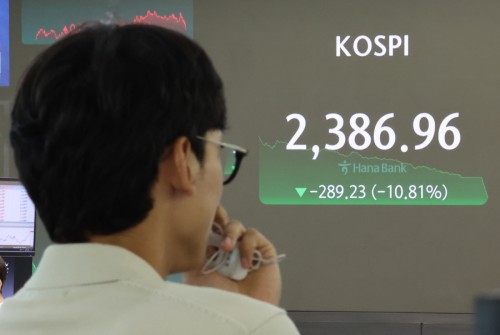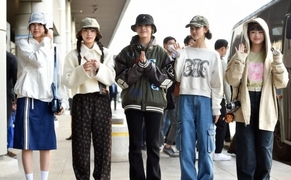 |
| The KOSPI index is seen on the dealing room board of Hana Bank headquarters in Seoul on Aug. 6, 2024. South Korea’s benchmark KOSPI index plunged 234.64 points, or 8.77 percent, to close at 2,441.55, marking its first daily drop exceeding 200 points./ Source: Yonhap |
AsiaToday reporter Lee Choong-jae
The U.S. recession fears triggered by deteriorating manufacturing outlook and rising unemployment is shaking global financial markets. Amid fluctuating US stock and bond markets and concerns about a hard landing, Asian markets experienced record drops, marking the worst “Black Monday” in history.
The aftermath of the U.S. jobs report, which shocked the global markets on Monday, continues. The U.S. employment index appears to be far less than expected, and the U.S. economy is rapidly slowing. As the U.S. economy is shaken, the aftershocks on major countries are inevitable.
Concerns over an AI bubble, which emerged as global big tech’s performance fell short of expectations, is adding cracks to the global economy. Besides, geopolitical risks are also at their peak, with Iran and Lebanese militant Hezbollah signaling a large-scale offensive targeting Israel as early as Monday.
As a result, global stock markets plummeted starting with the New York Stock Exchange. The KOSPI plunged 234.64 points to close at 2,441.55. This is the biggest drop in history. The decline is the largest in 16 years since October 2008.
The KOSPI started at 2611.30, down 64.89 points from the previous session, falling sharply. Finally, it fell more than 8 percent at 2:14 p.m., triggering a circuit breaker in the stock market, suspending trading for 20 minutes for the first time since March 2020. Upon resumption, the KOSPI nearly fell by 11 percent, briefly losing the 2400 level before recovering. The KOSPI’s lowest point on the day was 2,386.96, down 282.23 points. Due to the sharp drop, the combined market capitalization of the KOSPI and KOSDAQ have evaporated by about 235 trillion won in a day.
The Nikkei average plummeted by 12.4 percent. The Nikkei’s drop of 4,451 yen surpassed the 3,836 yen decline on Oct. 20, 1987, following the U.S. Black Monday. Taiwan’s Taiex also fell sharply by 1,807 points, breaking the record set just one trading day prior on Aug. 2, which was 1,004 points. Hong Kong’s stock market closed down 2.08 percent at 16,945.51.
The exchange rate fluctuated as well. The won-dollar exchange rate fell to the 1,350 won level during the day, the lowest level in more than three months. The yen-dollar exchange rate also fell to the 140-yen level.
#KOSPI #recession #KOSDAQ #stock market
Copyright by Asiatoday
Most Read
-
1
-
2
-
3
-
4
-
5
-
6
-
7





















